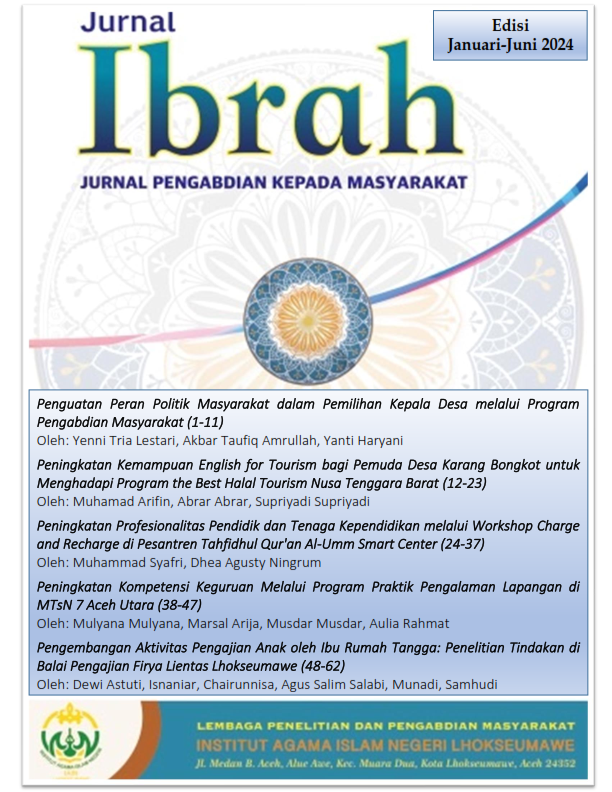Peningkatan Kompetensi Keguruan Melalui Program Praktik Pengalaman Lapangan di MTsN 7 Aceh Utara
DOI:
https://doi.org/10.47766/ibrah.v3i1.2130Keywords:
Field Experience Program, Teaching CompetenceAbstract
In an effort to enhance the teaching competencies of students, the Field Experience Program (PPL) at MTsN 7 Aceh Utara was implemented with the goal of applying educational theory in real-world practice. This study employs an action research approach with a classroom action research design, involving cycles of planning, implementation, observation, and reflection. The research methods include observation, interviews, documentation, and self-reflection by the practitioners. The collected data were analyzed descriptively to identify patterns and necessary improvements in the teaching process. The findings indicate that the implementation of PPL successfully improved practitioners' skills in determining and preparing teaching materials, applying effective teaching techniques, and developing well-structured Lesson Plans (RPP). Practitioners also gained direct teaching experience, enhanced classroom management, and better understood student characteristics. Additionally, the use of teaching media was refined, contributing to an increased understanding of the material by students. Although the PPL program yielded positive results, several challenges such as student attitudes and preparedness emerged. Efforts to address these challenges included regular consultations with supervising teachers, creating a conducive learning environment, personal approaches with students, and providing motivation. The recommendations from this study are the reinforcement of classroom management strategies, increased student participation through personal approaches, and the use of more varied teaching media to support a more effective teaching and learning process.
References
Arends, R. I. (2014). Learning to Teach. McGraw-Hill Education.
Arikunto, S. (2019). Prosedur Penelitian Suatu Pendekatan Praktik. Rineka cipta.
Arikunto, S., Suhardjono, & Supardi. (2021). Penelitian Tindakan Kelas: Edisi Revisi. Bumi Aksara.
Bararah, I. (2017). Efektifitas Perencanaan Pembelajaran dalam Pembelajaran Pendidikan Agama Islam di Sekolah. Jurnal MUDARRISUNA: Media Kajian Pendidikan Agama Islam, 7(1), 131–147. https://jurnal.ar-raniry.ac.id/index.php/mudarrisuna/article/view/1913.
Darling-Hammond, L. (2006). Powerful Teacher Education: Lessons from Exemplary Programs. Jossey-Bass.
Deci, E. L., & Ryan, R. M. (1985). Intrinsic Motivation and Self-Determination in Human Behavior. Springer.
Dewantara, K. H. (1977). Pendidikan: Bagian Pertama. Majelis Leluhur Taman Siswa.
Dewey, J. (1938). Experience and Education. Kappa Delta Pi.
Emmer, E. T., & Evertson, C. M. (2016). Classroom Management for Middle and High School Teachers. Pearson.
Gussevi, S., & Muhfi, N. A. (2021). Tantangan Mendidik Generasi Milenial Muslim di Era Revolusi Industri 4.0. Paedagogie: Jurnal Pendidikan dan Studi Islam, 2(01), 46–57. https://doi.org/10.52593/pdg.02.1.05.
Koehler, M. J., & Mishra, P. (2009). What Is Technological Pedagogical Content Knowledge (TPACK)? Contemporary Issues in Technology and Teacher Education, 9(1), 60-70. https://www.learntechlib.org/primary/p/29544/.
Maulidia, F. R., & Prafitasari, A. N. (2023). Strategi Pembelajaran Berdiferensiasi dalam Memenuhi Kebutuhan Belajar Peserta Didik. ScienceEdu, 6(1), 55. https://doi.org/10.19184/se.v6i1.40019.
Mayer, R. E. (2009). Multimedia Learning. Cambridge University Press.
Moleong, L. J. (2019). Metodologi Penelitian Kualitatif.
Mutiaramses, M., Neviyarni, S., & Murni, I. (2021). Peran Guru dalam Pengelolaan Kelas terhadap Hasil Belajar Siswa Sekolah Dasar. Pendas: Jurnal Ilmiah Pendidikan Dasar, 6(1), 43–48. https://doi.org/10.23969/jp.v6i1.4050.
Noddings, N. (2005). Caring in Education. Handbook of Moral and Character Education. Routledge.
Purnawanto, A. T. (2023). Pembelajaran Berdiferensiasi. Jurnal Pedagogy, 16(1), 34–54. https://jurnal.staimuhblora.ac.id/index.php/pedagogy/article/view/152.
Salmiah, M., Rusman, ِa. A., & Abidin, Z. (2021). Konsep Dasar Pengelolaan Kelas dalam Tinjauan Psikologi Manajemen. ITQAN: Jurnal Ilmu-Ilmu Kependidikan, 13(1), 41–60. https://doi.org/10.47766/itqan.v13i1.185/.
Schunk, D. H. (2012). Learning Theories: An Educational Perspective. Pearson.
Skinner, B. F. (1953). Science and Human Behavior. Free Press.
Sugiyono. (2015). Metode Penelitian & Pengembangan, untuk Bidang Pendidikan, Manajemen, Sosial, & Teknik (1st ed.). Alfabeta.
Tomlinson, C. A. (2001). How to Differentiate Instruction in Mixed-Ability Classrooms. ASCD.
Vygotsky, L. S. (1978). Mind in Society: The Development of Higher Psychological Processes. Harvard University Press.
Wiggins, G., & McTighe, J. (2005). Understanding by Design. ASCD.
Zainuddin, Z. (2021). Konsep Pendidikan Budi Pekerti Perspektif Ki Hadjar Dewantara. Kabillah: Journal of Social Community, 6(1), 8–25. https://ejournal.iainata.ac.id/index.php/kabilah/article/view/138.
Downloads
Published
Issue
Section
License
Copyright (c) 2024 Mulyana, Marsal Arija, Musdar, Aulia Rahmat

This work is licensed under a Creative Commons Attribution-ShareAlike 4.0 International License.











